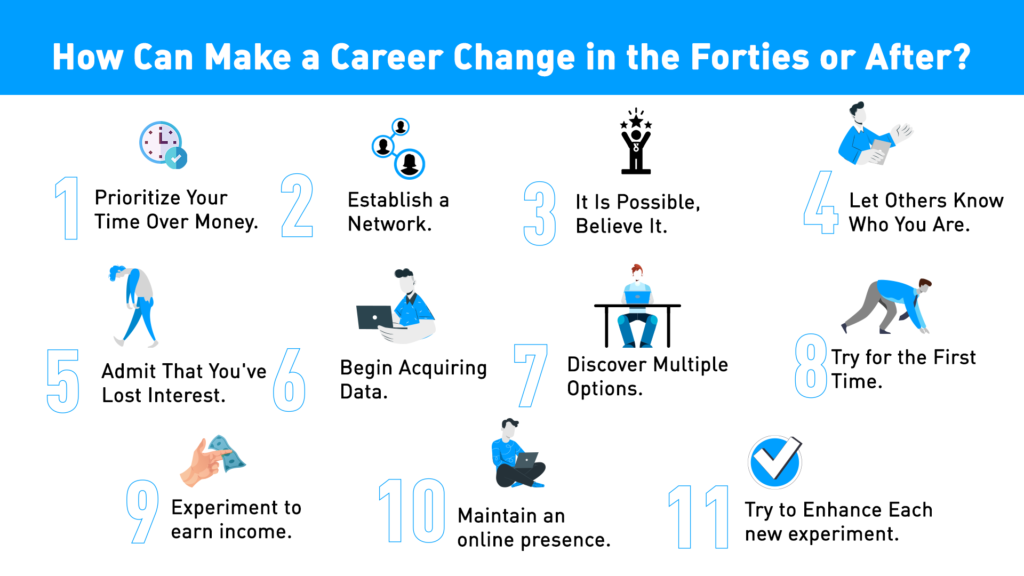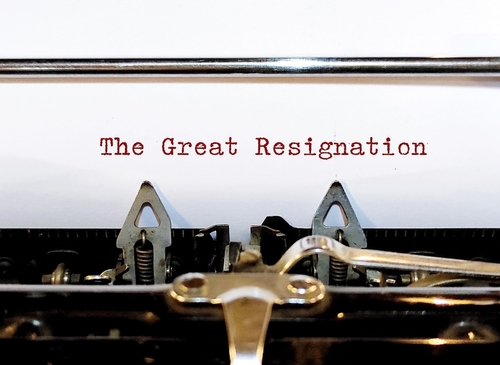How to Make a Career Change in the Forties - You don't have to feel stuck in your position. You may overcome concerns and self-doubt to change careers.

Dr. Job is here to show you eleven ways to make a career change in the forties or even after.
1. Prioritize Your Time Over Money.

Time is gone once it's gone. Waiting for the right time to change careers is a mistake.
Moreover, no scenario is perfect. You'll constantly want to improve something or finish a project before leaving.
Don't wait till retirement to change careers.
2. Establish a Network.

As you advance in your job, your peers also increase.
Read also, Top 12 Recession-Proof Jobs & Careers 2022
Even if most of your network isn't in your target business, you never know their connections' demands.
It would help if you let folks know you're planning a professional shift early so they can recommend you.
3. It Is Possible, Believe It.

What advice will friends give you if they haven't changed careers in 30 years? If they've been in the same career for 30 years, they probably value stability.
In addition, actions reflect beliefs in life. Someone wanting to establish a business shouldn't ask someone who hasn't.
Risk-averse people never start businesses. They'll talk about how most firms fail after five years.
Instead, ask a business owner about the challenges of beginning a company. They'll tell how they overcome challenges and the perks of being a company owner.
Talk to those who have successfully changed careers after 40 to overcome your worries and self-doubt.
They'll be upfront about the challenges and encourage you to try.
By learning from others' accomplishments, you may change careers at 40. If you internalize others' concerns and doubts, you surrender to your own.
4. Let Others Know Who You Are.

Your comfort zone is based on past experiences. So your current job is comfortable.
Even if your profession is sluggish and unproductive, it's your comfort zone. That explains why many individuals won't change careers.
Attending business events might help you establish a new career.
It would help if you prioritized attending local events and major conferences.Moreover, these events often include a professional development component where you can see what skills, certification, and education individuals want.
5. Admit That You've Lost Interest.

Find the most remarkable new occupations at 40, mark your schedule, and be decisive in making your change.
6. Begin Acquiring Data.

Consider those who get you. Discover how others view you. Consider asking them:
- Where am I most useful?
- Who am I?
- What drives me?
7. Discover Multiple Options.

This phase is difficult to complete alone, like most things in life. It would be best to have various ideas to explore and find yourself.
By involving family, friends, and coworkers, you may access many resources. People around you have thoughts you'd never consider.
8. Try for the First Time.

You won't have the time till you quit your work. Make your experiment a project to keep momentum. The project requires particular stuff. Which are:
- An easier-to-manage border
- Clear goals
- Project completion phases
9. Experiment to earn income.

- A tolerable side gig
- Realizing you enjoy self-employment despite a low initial paycheck
- Freelancing again
- Finding new clients, markets, and abilities to increase revenue.
- A long-term customer connection
Also, find new revenue-generating experiments. You may track these experiments back to discovery. Experimenting will help you locate a meaningful, high-paying job.
Experimenting creates magic. Fear fades as you gain confidence. You'll show yourself that you can do anything by working on many tasks.
10. Maintain an online presence.

Customize your profile for the position and industry.
11. Try to Enhance Each new experiment.

It's hard to make a big move alone at 40. You may get disheartened, have self-doubt, and lose perspective. Find help to avoid this. Find mentors, role models, and coaches. Meet with them often.
Working and experimenting won't get you very far. Your brain needs downtime to digest events.
Take a nap, travel, or stroll. New ideas generally come during downtime. Don't let others decide. Use your brain.
In conclusion,
Whatever the reason, you owe it to yourself to change careers. Your job experience can help you stand out.Start telling your professional narrative today.







 2025-01-28
2025-01-28
 2025-01-09
2025-01-09
 2025-01-06
2025-01-06
 2024-12-22
2024-12-22
 2022-11-08
2022-11-08